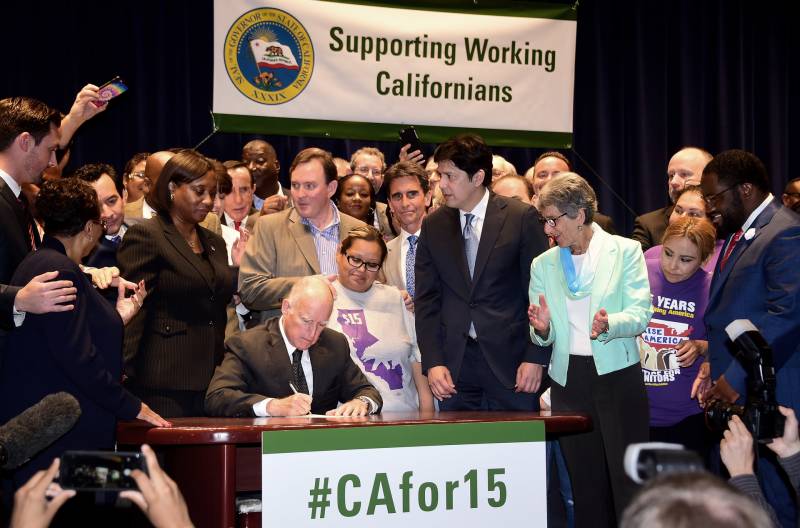"When it started to move in places like L.A. and Long Beach, then we felt like we had some real momentum," said Laphonza Butler, then president of Service Employees International Union Local 2015, California's largest union, which represents long-term care workers. "As people started to really believe that it was possible, there started to be more conversation."
Now, supporters hope years of state-level hikes can likewise set the stage for federal action. President Biden has proposed a plan to reach a federal $15 minimum wage as part of his $1.9 trillion relief package, and legislation to reach that same benchmark has also been introduced in Congress.
Veterans of California’s minimum wage fight, on both sides of the issue, say some of the lessons from here could inform the debate getting underway in Congress — while also acknowledging that the grassroots support that forced state lawmakers in Sacramento to act will be hard to replicate in Washington.
In California, organized labor pursued a more aggressive minimum wage increase through ballot initiatives. Hoping to ward off an expensive ballot fight that would drain labor resources from other Democratic priorities, Brown and the state Legislature hashed out a compromise plan.
The legislation — Senate Bill 3 — signed by Brown, phased in the $15 minimum wage over six years.
"The initiative put on the ballot by SEIU gave a real thrust," said Brown at the bill's signing ceremony in 2016. "I would have to say without that, we probably wouldn't be here today."
That political pressure (and California's Democratic supermajority in the Legislature) doesn't exist at the federal level, but supporters of a wage hike point to a similar dynamic of successes at lower levels of government building momentum toward large-scale change.
In the years since California's minimum wage bill was signed, more than a dozen states have followed suit by increasing their minimum wages. Currently, 29 states have a minimum above the current federal floor of $7.25 an hour.
Butler, now director of public policy at Airbnb, said the increases have set the table for national legislation.
"If I am a member of Congress or if I am President Biden, I now have proof points that economies can continue to survive, local businesses can continue to survive and our economies can continue to grow," she said.
Ken Jacobs, chair of the UC Berkeley Labor Center, said there is a lag time in researchers’ ability to analyze California's gradual move toward a $15 minimum wage, which reached $14 an hour for large employers this year and $13 for small businesses.
But Jacobs said similar increases in cities such as San Francisco "have led to measurable, strong increases in workers' pay, [and] we are not seeing effects on employment overall."
Critics of Biden's minimum wage proposal argue that workers and businesses outside of urban centers will be hurt most by the plan. And they point to a 2019 Congressional Budget Office estimate that a $15 minimum wage bill would result in the same number of people losing their jobs (1.3 million) as those lifted out of poverty.
"The cost of living in an area like the Bay Area or San Diego is very different than the cost of living in the places that I represent in rural California," said U.S. Rep. Jay Obernolte, R-Big Bear Lake. "The minimum wage should reflect that, if the intention is to pay people enough to live on."
Obernolte, who started his own video game business before serving in the state Assembly, voted against California's minimum wage hike. He said California, and now the nation, would be better served by a plan that sets different minimum wages by region, an idea the state of New York adopted in 2016.
"Why is that approach not the best one?" Obernolte said. "How can you argue that the cost of living in California is the same as the cost of living in Iowa?"
A 2019 study from UC Berkeley’s Center on Wage and Employment Dynamics found that large minimum wage hikes in areas with lower median wages, such as Fresno, still benefited low-wage workers without costing many jobs.

